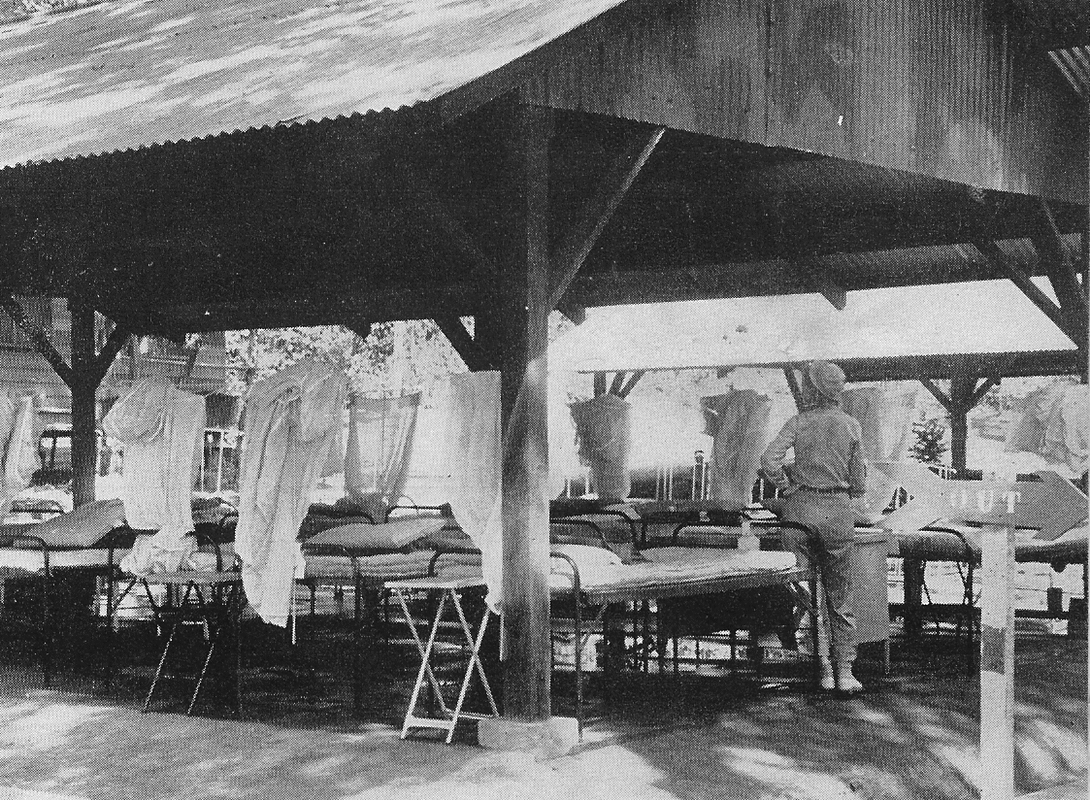|
As the new year begins I settle on a slogan to help me form a positive habit over the next twelve months. For 2014 my slogan is a question. What would you do, Mary, if you weren't afraid?
I know this isn't an original thought. Do something everyday that scares you, is a similar quote I hear a lot attributed to Eleanor Roosevelt. But often with common sayings we don’t pause to consider the meaning. If I've stopped to think about these sentiments at all, I've discarded them out of hand. I’m not scared of anything. Okay, I am scared of snakes, but I can live with that, and I see no reason to delve into it or sign up for a snake handling class. My life is fine, thank you. I don’t need to sky dive or swim with sharks. But what hit me this week is that the things we are most afraid of are not exotic feats of nerve. They are things very close to us. Things we encounter without straying from our daily routine. What would you do today, Mary, if you weren't afraid? It took less than three seconds for me to realize the thing I’m most afraid of right now is resuming work on my novel. I legitimately put it aside to work on a manuscript already under contract, which will be finished soon. Very soon there will be no reason not to open that novel document and begin revising. Why is that scary? You might ask, isn't that what you do every day, Mary? Write stories? It’s scary because it matters so much. There in lies the clue to discovering what scares you the most. I guarantee, if you’re honest, it’s those few things that matter most to us that generate our fears. The scariest things of all are love and creativity. Unconditional love strips us naked. Funny thing, it’s scary whether you’re giving it or receiving it. Love never stands still. By nature, love grows. Growth is change and love insists we grow along with it. What true thing would you say to your loved one if you weren't afraid of hurt feelings? How would you interact with your children if you had no fear for the future? Out of love for yourself, what would you stop putting off, if you weren’t afraid? Like love, creativity urges us to change, to shake up the status quo. If we don’t think about it we realize our natural inclination is to try to keep things as they are, to hold on for fear of losing what we have. This effort toward stagnation strangles love and creativity. It’s amazing what we will do to stop creativity from blooming, to stop love from flourishing. Sometimes all it takes is turning on the TV or checking Facebook, but sometimes we go to elaborate lengths to thwart intimacy. For creativity is nothing if not intimacy with our very selves. The key to intimacy is vulnerability. Getting back to that being stripped naked—that’s what I’m afraid of. That’s what must happen if I’m to finish my novel. Is it love or creativity that scares you most? What would you do today, if you weren't afraid? Come on...tell me I'm not alone in this. 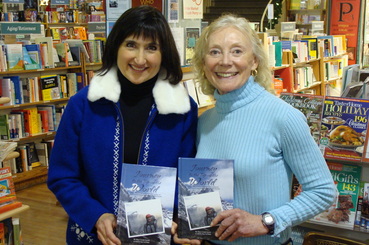 Only five more days 'til Christmas! I hope you will be spending it with your loved ones near. If you still have last minute shopping to do, may I suggest books? Not fattening. Don't take up much space. And they can be re-gifted next year. 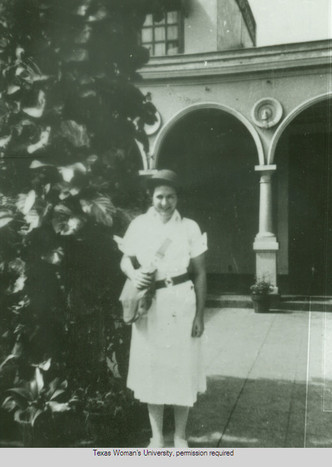 And now for the main story Christmas Eve, 1941... The Japanese Army marched toward Manila, set to conquer the Philippines. American Army Nurse Hattie Brantley and two dozen other military nurses had been ordered to join the army convoy retreating from the city. "Girls, pack your bags," the medical commander told them. "You're going to Bataan tomorrow." "Some of us had never heard of Bataan," said Hattie. "On the morning of Christmas Eve, we loaded into buses and open trucks, dressed in our white duty uniforms, a World War I helmet on our heads, and a gas mask ear our sides and headed for the Bataan Peninsula." Hattie was from Jefferson, Texas, and had only arrived in the Philippines that summer. The group headed for Bataan became the first group of American military women ordered into combat. The army trucks and yellow buses spaced themselves ten minutes apart, but still Japanese planes sighted the convoy. Drivers zig-zagged or lurched off road under the trees to avoid the falling bombs. Nurses jumped out, diving into ditches alongside the road. Hattie had always craved adventure, saying she didn't want her mother's life as a farm wife with half a dozen kids pulling at her skirt while she washed and cleaned and hoed the garden. She had plenty of adventure now.Eventually, the buses got on their way jolting along the coast road. It was one of the hottest Decembers on record in the history of Bataan. In late afternoon, the convoy pulled into the sleepy fishing village of Limay, a bunch of tiny bamboo shacks set high on stilts. Round-eyed children stared as the line of trucks and buses crawling down the dirt road toward the beach and U.S. Army General Hospital #1. The nurses stared, too, in shock, at the primitive camp with long barracks constructed of bamboo with grass roofs. Windows consisted of flaps that could be lowered when it rained. “To call it a hospital, is like calling a hut a hotel,” said Historian John Glusman, whose father was a navy doctor on Bataan. Like Hattie, many of the nurses had grown up on farms. They were used to hard work and doing without. "Set up? Ready to go? In a pig's eye." Hattie told a reporter her memories of that day in 2003. They scrounged up metal cots, bedpans and other provisions that were stored in sheds. These relics of World War I were wrapped in newspapers dated 1918. Later the nurses ate a quick supper of field pancakes and walked down to relax on the beach. Somebody remembered it was Christmas Eve. Across the bay explosions lit the night sky as the military dynamited ammunition dumps and burned petroleum at Cavite Naval Yard to keep it from the enemy.
“We wondered what was happening to us,” remembered Hattie, but she had faith, hope and trust in God, General MacArthur, F.D.R. and the U.S.A. The hospital was ready for patients, but with a little luck, it wouldn’t be needed. Surely, help was on its way. “In fact, anytime anyone looked in the direction of the bay and did not see a convoy steaming in, it was with disbelief! Hattie was sure American ships filled with men, weapons and supplies would arrive to rescue them “…at least by tomorrow.” American troops would not come to the rescue of Hattie and 67 other Army and Navy nurses for more than three years. 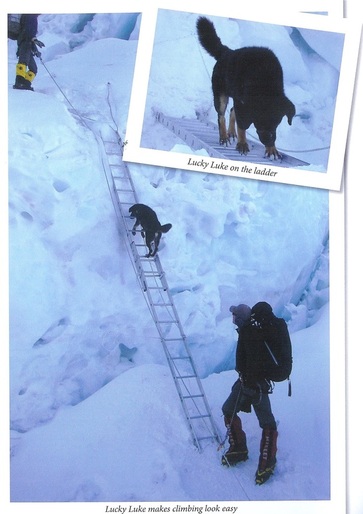 Leaving Everest Base Camp, the first stretch toward the peak takes climbers through the Khumbu Ice Fall. In 1.62 miles they gain two-thousand feet in elevation, snaking over deep crevasses and between tall seracs, which are huge columns of ice towering overhead. Climbers (and stray dogs like Lucky Luke) cross the crevasses on aluminum ladders strategically placed early in the season. We don't know how long Lucky had been climbing up and down the ladders en-route to Camp 1. He earned his nickname due to the fact he had not yet fallen. Near vertical walls fall away to a drop of a hundred feet or more. Some mountaineers refuse to look down into the abyss. Kay LeClaire took a peek between rungs. The ice is a beautiful blue, but one must not gawk for long. More climbers die in this ice fall than any part of South Col route up Everest. But Kay started preparing for this moment years ago... Excerpt from JOURNEY TO THE TOP OF THE WORLD: One cold, gray Saturday, our class meets at a rock-climbing park to practice. My heart sinks when I look at the steep cliffs. At five foot, one inch tall, often I cannot reach the hand and foot holds used by taller climbers. I must grope for my own. Before long, I’m clinging to the sheer rock, unable to reach any hold. My heart hammers. I’m gasping for breath. Rope anchors me to the rock from above. If I peel off, I won’t fall far. But I freeze. “What should I do?” I whimper like a toddler. “Go up,” says the instructor, not a shred of sympathy in his voice. Get a grip, Kay. I scold myself, then scrabble for a hand hold. Up I go. I feel great when I reach the top, but that success didn’t dispel my fear forever. The panic can return anytime. Mountain climbing is dangerous, and there have been times I could have died. Sometimes a climber gets hit by a rock fall or avalanche. That’s just it. When the panic comes, I’ve learned to take a deep breath and focus. Focus on the job at hand. I’ve trained. I have the proper gear and knowledge. I don’t take unnecessary risks. The rest is out of my control. Thanks, Kay. It sounds like good advice for life as well as mountain climbing! I've felt panic sitting safely in my chair facing a day of writing. My life is not at risk, but something sure is, or it wouldn't feel so scary. What about you? What makes you quake with fear and need to remind yourself to focus on the job at hand and let go of the rest? Click here for more about JOURNEY TO THE TOP OF THE WORLD. What About the Women? 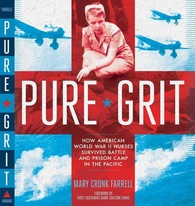 Nine hours after the Japanese bombed Pearl Harbor they attacked American Bases in the Philippines. Japanese pilots expected fierce fighting when they cleared the mountains north of Manila with their sights on Clark Air Field. Instead, they found U.S. B-17 bombers and P-40 fighter planes lined up on the runway like knives in a box. American flight crews were eating lunch. Less than an hour later, nearly half of the U.S. Air Forces in the Far East were destroyed. PURE GRIT tells the amazing story of 100 American military woman stationed in the Philippines when the Japanese attacked. How they survived battle followed by three years in POW camp testifies to the strength of the human spirit. |
I'm fascinated to discover little-known history, stories of people and events that provide a new perspective on why and how things happened, new voices that haven't been heard, insight into how the past brought us here today, and how it might guide us to a better future.
I also post here about my books and feature other authors and their books on compelling and important historical topics. Occasionally, I share what makes me happy, pictures of my garden, recipes I've made, events I've attended, people I've met. I'm always happy to hear from readers in the blog comments, by email or social media. Archives
September 2023
Categories
All
|
